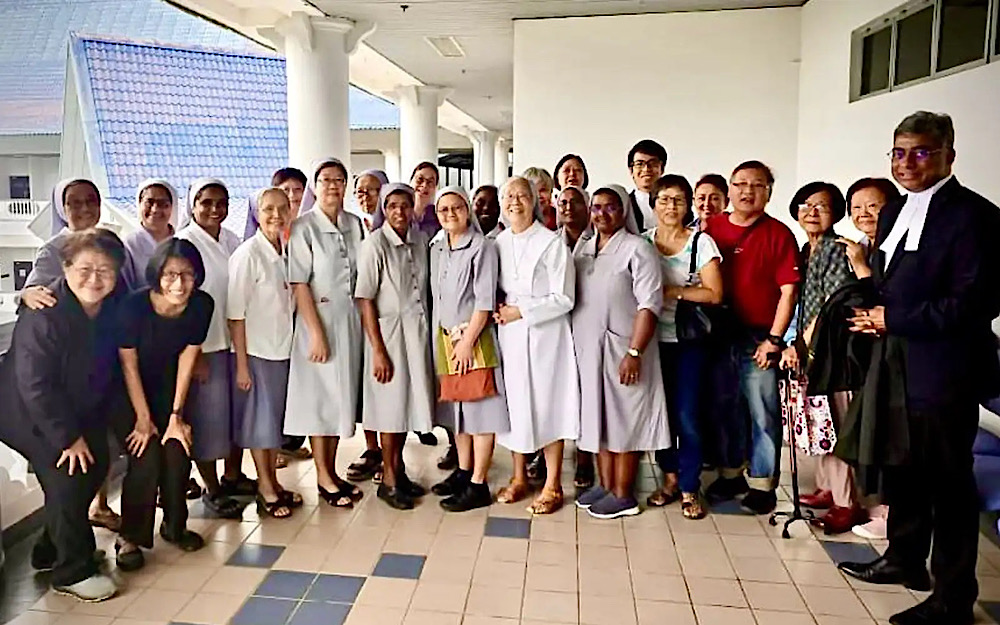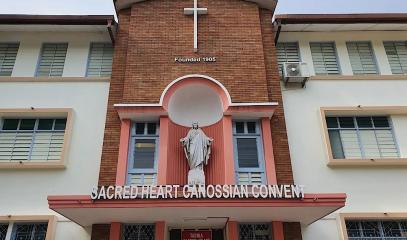Malacca: nuns and Portuguese Mission in court over convent property
The appeal to the High Court to obtain documents related to “Lot 6” where the Canossian Convent of Banda Hilir has stood for 120 years. The area is also home to a primary and secondary school that accommodate hundreds of students. The title deed was lost during World War II with the Japanese invasion.
Kuala Lumpur (AsiaNews) - The Canossian Sisters (Daughters of Charity), led by their mother superior, with the help of the Portuguese Mission in China and Singapore, have initiated a legal battle in the High Court to obtain the right of ownership of a historic piece of land.
It is the so-called “Lot 6” where the Canossian Convent of Banda Hilir in Malacca, Malaysia, has stood for nearly 120 years. Through a written judgment, the religious women are aiming to gain legal possession of the structure to avert attempts to expropriate it in the future.
Attorney Joy Appukuttan, who represents the religious sisters and the Portuguese Mission, explained in court that the property has been repeatedly identified as the “Portuguese Convent” in documents signed in the past and submitted to the courts.
The lawyer also pointed out how the name itself is listed on the deed issued at the time of Dutch rule in the region. Appukuttan took a clear position before Judge Radzi Abdul Hamid, who is presiding over the judicial review petition filed by two statutory bodies, the Canossian Sisters and the Portuguese Mission.
Appukuttan then added that Lot 6 has been the home of the Canossian Sisters and has housed orphans and boarders since 1905, then in 1929 an elementary school was established which was joined by a secondary school in 1950.
The congregation and mission claim that the deed, issued during the Dutch occupation, was in the custody of Catholic priest Fr. Alvaro Martins Corado during World War II.
The deed was lost after Corado-at the time vicar of both St. Peter's Church, Malacca, and the Portuguese Convent-was arrested and imprisoned by the Japanese in 1942. According to the applicants, he died in captivity two years later.
The applicants went on to say that they have been engaged in extensive correspondence over the past 10 years, along with communications and meetings with Malacca state authorities in an attempt to obtain the issuance of a new title to replace the lost document.
Nevertheless, in a letter dated March 8, 2022, the state authorities stated that they were not competent to award the title to the applicants. Hence, the applicants chose to seek permission to initiate the present legal proceedings two months later, in May 2022.
On Jan. 6 last year, Judge Radzi granted them permission to handle the matter inter partes by initiating the court proceedings, and then adjourned the hearing to Sept. 4, when he will hear further submissions from Appukuttan and the defendants.
A large group of Canossian sisters, alumni and supporters, along with attorney Joy Appukuttan, attended the hearing. The Christian community's hope is that the high court will issue a declaration confirming the ownership of Lot 6 and a directive directing the defendants to take the necessary steps to release the title of the possession drafted in their name.
Religious women have a more than century-old presence in the area, with the first community established in 1905. However, the earliest traces of the presence date back to 1884, when then Bishop D. Antonio Joaquim Medeiro of the Portuguese Mission (Pcmh), under the supervision of the Diocese of Macau, invited an initial group of Canossian Sisters to establish a convent and school in the parish of St. Peter, founded in 1710.
This reality, with ups and downs, has developed over time and today includes 256 students in the elementary school, supervised by 30 teachers and six support staff. The secondary school is attended by 521 students, with 44 teachers and eight support staff members.
07/02/2019 17:28








.png)










